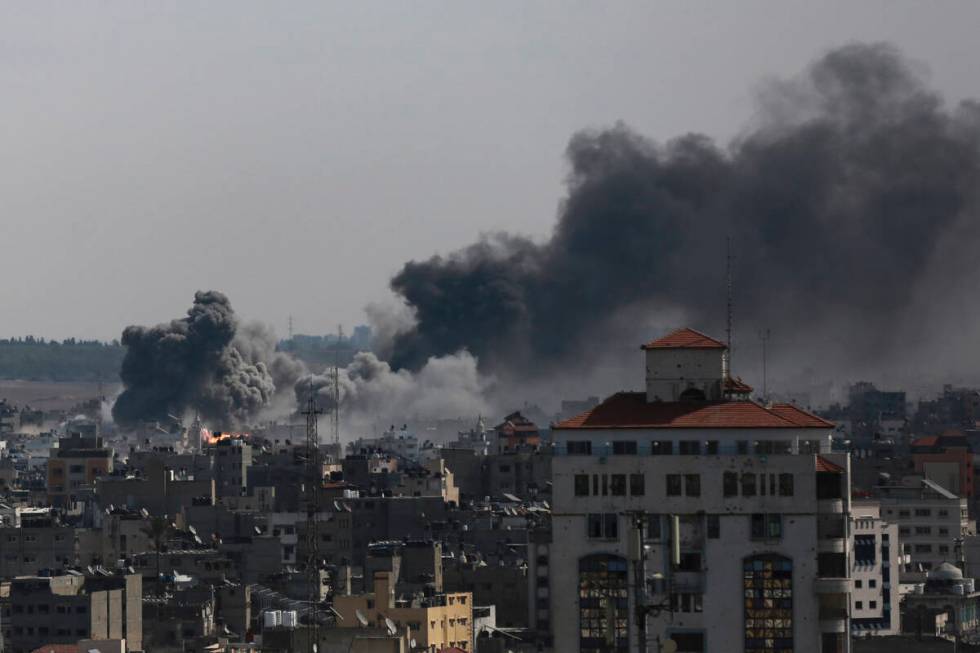Egypt border briefly opens to let limited humanitarian aid into Gaza

RAFAH, Gaza Strip — The border crossing between Egypt and Gaza opened Saturday to let humanitarian aid into the besieged Palestinian territory for the first time since Hamas’ bloody terrorist rampage in Israel two weeks ago.
Twenty trucks were allowed in. More than 200 trucks carrying 3,000 tons of aid have been waiting nearby for days.
Rear Adm. Daniel Hagari, an Israeli military spokesman, said the aid would be delivered only to southern Gaza, where the army has ordered people to relocate, adding that no fuel would enter. A senior Israeli military official said the air force would not hit the area where aid is being distributed unless rockets are fired from there. “It’s a safe zone,” said the official, who spoke on condition of anonymity in order to reveal military information.
U.S. Secretary of State Antony Blinken appealed to all sides to keep the crossing open for crucial aid shipments and warned Hamas terrorists to not take the aid.
“Palestinian civilians are not responsible for Hamas’s horrific terrorism, and they should not be made to suffer for its depraved acts,” he said in a statement. “As President Biden stated, if Hamas steals or diverts this assistance it will have demonstrated once again that it has no regard for the welfare of the Palestinian people.”
Gaza’s 2.3 million Palestinians, half of whom have fled their homes, are rationing food and drinking dirty water. Hospitals say they are running low on medical supplies and fuel for emergency generators amid a territory-wide power blackout. Five hospitals have stopped functioning because of fuel shortages and bombing damage, the Hamas-run Health Ministry said.
Palestinian terrorists are still firing rockets into Israel, which is launching waves of airstrikes across Gaza in retaliation for the Oct. 7 terrorist invasion that killed more than 1,400 Israelis — mostly civilians — and took more than 200 people hostage. Israel has vowed to destroy Hamas, which has controlled Gaza since 2007 and is recognized by the U.S. as a terrorist organization.
The border opening came after more than a week of high-level diplomacy, including visits to the region by U.S. President Joe Biden and U.N. Secretary-General Antonio Guterres. Israel had insisted nothing would enter Gaza until Hamas released all the captives from its Oct. 7 attack on towns in southern Israel.
Late Friday, Hamas freed its first captives — an American woman and her teenage daughter. It was not immediately clear if there was a connection between the release and the aid deliveries. Israel says Hamas is still holding at least 210 hostages.
On Saturday morning, an Associated Press reporter saw the 20 trucks heading north from Rafah to Deir al-Balah, a quiet farming town where many evacuees from the north have sought shelter. Hundreds of foreign passport holders at Rafah hoping to escape the conflict were not allowed to leave.
American citizen Dina al- Khatib said she and her family were desperate to get out. “It’s not like previous wars,” she said. “There is no electricity, no water, no internet, nothing.”
The trucks were carrying 44,000 bottles of drinking water — enough for 22,000 people for a single day, it said. “This first, limited water will save lives, but the needs are immediate and immense,” said UNICEF Executive Director Catherine Russell.
The World Health Organization said four of the trucks were carrying medical supplies, including trauma medicine and portable trauma bags for first responders.
“The situation is catastrophic in Gaza,” the head of the U.N.’s World Food Program, Cindy McCain, told The Associated Press.
Two Egyptian officials and a European diplomat said extensive negotiations with Israel and the U.N. to allow fuel deliveries for hospitals had yielded little progress. They spoke on condition of anonymity because they were not authorized to release information on the sensitive deliberations.
One Egyptian official said they were discussing the release of dual-national hostages in return for the fuel, but that Israel was insisting on the release of all hostages.
Reuters reported Friday that Hamas has suggested the hostages could be swapped for approximately 6,000 Palestinians held in Israeli prisons.
The release of Judith Raanan and her 17-year-old daughter, Natalie, on Friday brought some hope to the families of others believed held hostage.
Rachel Goldberg, whose son is thought to have been badly wounded before he was taken hostage, said she was “very relieved” by the news.
“We are hopeful that that the people who were behind this wonderful release of Judith and Natalie will keep working night and day. But quickly,” she said. “I think he could be dying. So we don’t have time.”
Hamas said it was working with Egypt, Qatar and other mediators “to close the case” of hostages if security circumstances permit.
There are growing expectations of a ground offensive that Israel says would be aimed at rooting out Hamas. Israel said Friday it does not plan to take long-term control over the small but densely populated Palestinian territory.
Israel has also traded fire along its northern border with Lebanon’s Hezbollah militants, raising concerns about a second front opening up. The Israeli military said Saturday it struck Hezbollah targets in Lebanon in response to recent rocket launches and attacks with anti-tank missiles. Hezbollah, like Hamas, is an Iranian proxy. Iran has vowed to destroy Israel.
“Hezbollah has decided to participate in the fighting, and we are exacting a heavy price for this,” Israeli Defense Minister Yoav Gallant said during a visit to the border.
———
Magdy reported from Cairo and Krauss from Jerusalem. Associated Press journalists Isabel DeBre, Julia Frankel and Ravi Nessman in Jerusalem, Sam Magdy in Cairo, and Bassem Mroue in Beirut contributed to this report.